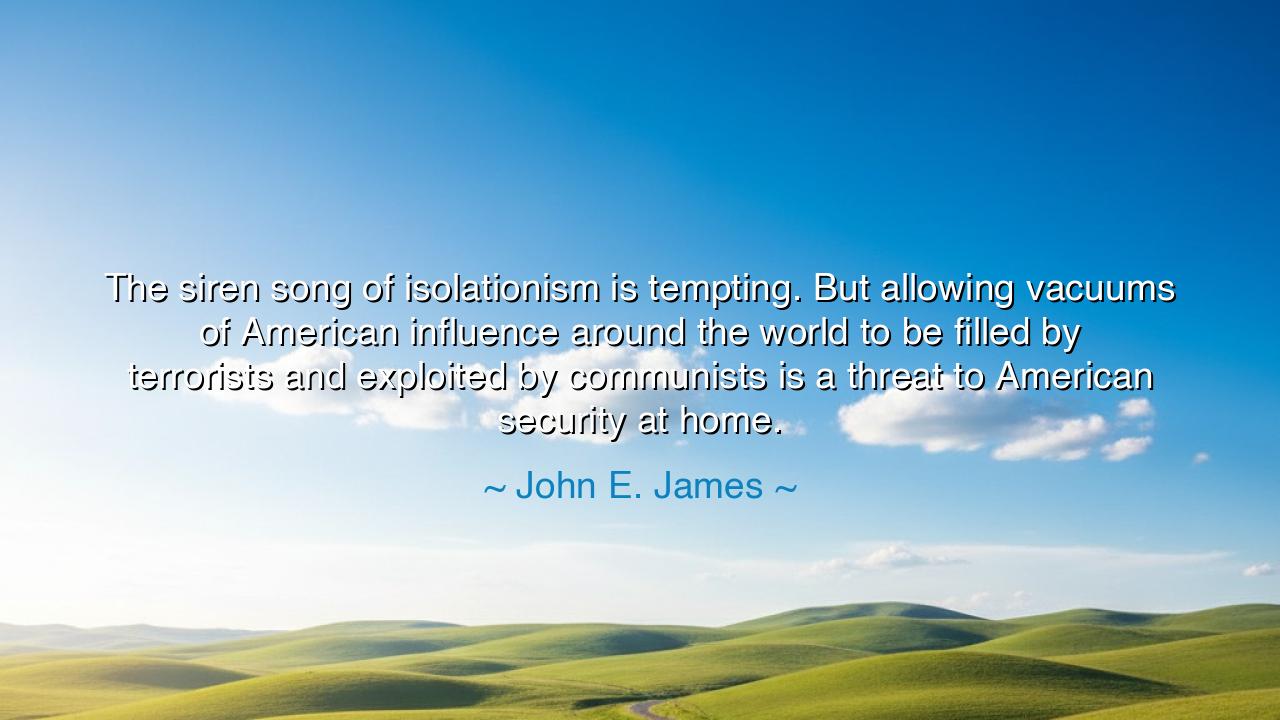
The siren song of isolationism is tempting. But allowing vacuums
The siren song of isolationism is tempting. But allowing vacuums of American influence around the world to be filled by terrorists and exploited by communists is a threat to American security at home.






When John E. James declared, “The siren song of isolationism is tempting. But allowing vacuums of American influence around the world to be filled by terrorists and exploited by communists is a threat to American security at home,” he spoke not as a mere politician, but as a student of history — one who understood the ancient rhythm of power, responsibility, and vigilance. His words carry the weight of a warning: that withdrawal from the world, though alluring in its promise of peace and simplicity, invites chaos to fill the void. In his metaphor, James invokes the siren, that mythical creature whose song lured sailors to destruction — beautiful to hear, yet deadly to follow. So too, he says, is the call to retreat from global engagement: it seems wise, even moral, but beneath its melody lies ruin.
The siren song of isolationism is not new; it has echoed through the ages. After every great conflict, nations weary of bloodshed and loss long to turn inward, to rest, to rebuild. The instinct is human — the desire to protect one’s own, to withdraw from the endless tide of foreign troubles. Yet James reminds us that in the grand design of the world, power abhors a vacuum. When a great nation withdraws, others — less benevolent, more ruthless — step forward. The world, like the sea, never stands still. To retreat from its currents is not to find safety, but to surrender direction to forces that do not share our values.
History stands as witness to the truth of his warning. Consider the long shadow of the 20th century, when after the Great War, America turned inward, weary of foreign entanglements. The spirit of isolation ruled the land — “no more foreign wars,” the people cried. Yet across the ocean, tyranny grew in silence. Fascism rose in Italy, Nazism in Germany, militarism in Japan. While democracies slept, the world darkened. And when the fire finally reached America’s shores at Pearl Harbor, the cost of that slumber was measured in oceans of blood. Thus, James’ words are not abstract; they are forged in the memory of generations who learned, through suffering, that inaction invites evil as surely as war.
In the modern age, his warning takes on new form. The enemies are no longer empires in uniform, but terrorists and ideologues, invisible yet deadly. When America — or any great power — withdraws from the global stage, it leaves behind vacuums in which chaos breeds. We have seen it in the deserts of the Middle East, where withdrawal created space for terror; in the jungles of Asia, where power vacuums were filled by communist regimes; and in the shifting tides of Europe and Africa, where neglect breeds instability. James’ insight is thus not rooted in aggression, but in responsibility — the recognition that leadership is not merely privilege, but burden. To lead the world is not to dominate it, but to hold back the flood when others will not.
The ancients understood this law well. When Rome withdrew from its far-flung provinces, believing the empire could secure itself by shrinking, the barbarians surged in. The walls of Rome could not save her, for power, once abdicated, is never truly contained. The same is true today, James implies, in the moral and strategic sense. The walls of oceans or borders cannot protect a nation whose values and influence have receded from the world stage. Security is not the fruit of isolation, but of engagement. To protect one’s home, one must be vigilant abroad — for threats born in distant lands do not remain distant for long.
Yet his metaphor of the siren carries not only warning, but wisdom. The song of isolation is tempting, for it appeals to our fatigue, our fear, our yearning for peace. It promises safety without sacrifice, prosperity without duty. But like the sailors of Odysseus, who bound themselves to the mast to resist the siren’s call, we too must anchor ourselves to principle — to courage, vigilance, and stewardship. To resist the song is not to deny the need for peace, but to understand that peace must be guarded, not wished into being.
Thus, O listener, take this lesson as both civic and personal truth: retreat breeds ruin, and responsibility is the price of freedom. In your own life, the same pattern holds. When you withdraw from hardship, when you leave spaces unattended — in your work, your relationships, your duties — chaos enters. Whether in nations or in souls, vacuums invite decay. Do not be tempted by the ease of avoidance. Engage with the world, however weary you may be, for to act is to preserve, and to lead is to protect.
And so, the wisdom of John E. James stands among the timeless teachings: that vigilance is the armor of peace, and that leadership — whether of nations or of hearts — must not surrender to comfort. Resist the siren song. Stay at the helm. For though the waters of duty are perilous, it is upon them, not upon the still shores of withdrawal, that the fate of all enduring civilizations is decided.






AAdministratorAdministrator
Welcome, honored guests. Please leave a comment, we will respond soon